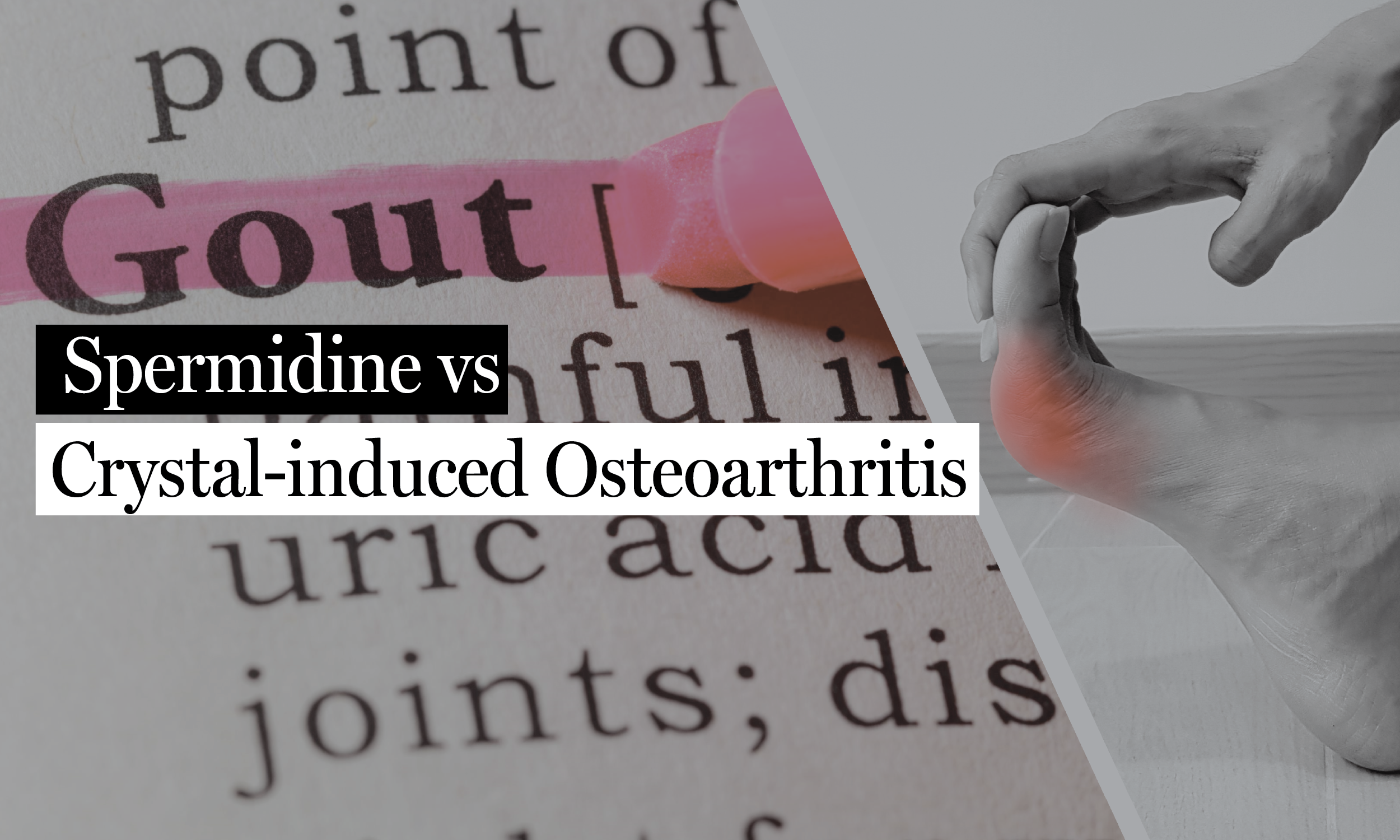
Gout and calcium pyrophosphate deposition disease (CPPD or pseudogout) are among the leading causes of recurrent, painful joint inflammation. While standard treatments such as colchicine, NSAIDs, corticosteroids, and IL-1β blockers offer relief for many, nearly half of patients continue to struggle with persistent pain and unwanted side effects. This challenge has fueled growing interest in safer therapies to control inflammation.
One promising avenue is spermidine, a natural polyamine abundant in foods like wheat germ, aged cheese, soy, and fermented products. A recent study in Arthritis & Rheumatology reveals that both intermittent fasting and its mimetic, spermidine, can suppress crystal-induced inflammation. These findings mark an exciting step forward, pointing to novel therapeutic strategies for managing these debilitating conditions.
What is Crystal-Induced Arthritis (Gout/Pseudogout)?
Arthritis encompasses several conditions that affect the joints. By prevalence, they are typically categorized as:
- Degenerative arthritis: Caused by wear-and-tear, most commonly osteoarthritis.
- Crystal-induced arthritis: Caused by crystal deposits in joints.
- Autoimmune arthritis: Driven by immune dysfunction.
- Infectious arthritis: Caused by joint infections, e.g., septic arthritis.
Crystal-induced arthritis happens when crystals build up in joints or surrounding tissues. Crystal types and their associated diseases are (see table below for more details):
- Monosodium urate (MSU): Gout
- Calcium pyrophosphate (CPP): CPPD / Pseudogout
- Basic calcium phosphate (BCP): BCP disease


These crystals trigger a strong inflammatory response through activation of the NLRP3 inflammasome (an internal “danger sensor” inside immune cells that detects stress or harmful particles) and release of interleukin-1β (IL-1β, a powerful “alarm signal” protein that calls in more immune cells and fuels inflammation). This cascade results in classic symptoms: sudden, severe joint pain, swelling, redness, warmth, and stiffness.
Without timely treatment, acute flares can progress to chronic joint damage. Standard therapies (colchicine, NSAIDs, corticosteroids) help but often cause side effects such as stomach upset or cardiovascular risks, leaving many patients with inadequate relief and prompting interest in alternatives like intermittent fasting.
Inflammation Reduces Spermidine Levels
A new study using a mouse model of MSU- and CPP crystal-induced inflammation revealed that crystal-induced inflammation significantly reduces local spermidine production while upregulating SAT1 (spermidine/spermine N-acetyltransferase 1), the enzyme responsible for its degradation. Less spermidine means more inflammation.
Intermittent Fasting: A Natural Anti-Inflammatory Mechanism
Intermittent fasting (IF), characterized by periodic food restriction, has been shown to reduce inflammation and improve overall health. In this new study, mice with crystal-induced inflammation that fasted for two non-consecutive days per week experienced significantly less inflammatory cell infiltration and lower production of cytokines, including IL-1β and CXCL-1.
These anti-inflammatory effects were linked to systemic metabolic changes, particularly in the bloodstream and liver. IF enhanced pathways related to fatty acid oxidation, amino acid metabolism, and the tricarboxylic acid (TCA) cycle, increasing the production of anti-inflammatory metabolites such as β-hydroxybutyrate (BHB), corticosterone, and notably, spermidine.
The finding that IF promotes systemic spermidine production was highlighted in a groundbreaking recent study published in Nature Cell Biology (see our blog for details). This new research reinforces the important link between fasting and spermidine, suggesting that spermidine may play a key role in mediating the anti-inflammatory benefits of IF.
Interestingly, the study also found that crystal-induced inflammation locally reduced spermidine levels at affected sites, even in mice undergoing IF. This highlights the potential benefit of supplementation to restore protective spermidine levels and help counteract inflammation.

Spermidine as a Key Anti-Inflammatory Mediator
This figure illustrates how spermidine protects against crystal-induced inflammation:
Intermittent Fasting (IF): Boosts anti-inflammatory metabolites, including spermidine, and regulates metabolic pathways. Spermidine Supplementation: Mimics IF by inhibiting NF-κB (inflammatory switch), NLRP3 inflammasome (inflammatory alarm), and promoting M2 macrophages (inflammation-resolving immune cells).
SAT1 Inhibition: Limits spermidine breakdown, reducing IL-1β and inflammation.
Spermidine emerges as the central player, showing how these strategies converge to control joint inflammation via the polyamine pathway. Figure from Pham et al.
Spermidine: Mimicking Fasting, Fighting Inflammation
In the study, researchers tested whether spermidine could reduce the immune response triggered by MSU and CPP crystals. Mice received spermidine either through drinking water for three weeks or local injections into the inflamed site and showed a dramatic reduction in inflammation, similar to intermittent fasting, suggesting that spermidine can act as a “fasting mimetic”.
How Spermidine Works to Fight Crystal-Induced Inflammation
Spermidine works through several mechanisms to exert its anti-inflammatory effects, as demonstrated in this study:
-
Inhibition of NF-κB and NLRP3 inflammasome
Spermidine suppresses NF-κB activation, reducing the production of pro-inflammatory cytokines like IL-1β and TNF. It also inhibits the NLRP3 inflammasome, which is critical for the activation of IL-1β and other inflammatory responses. -
Promotion of autophagy
Spermidine activates autophagy, the process that helps clear damaged cellular components, thereby reducing inflammation. This is achieved through the hypusination of eIF5A, which promotes the expression of autophagy-related genes. -
M2 macrophage polarization
Spermidine promotes the polarization of macrophages toward the M2 phenotype, which is associated with anti-inflammatory and tissue-repair functions. -
Reduction of pro-inflammatory cytokines
Spermidine reduces the production of inflammatory cytokines, including IL-1β and CXCL-1, in response to crystal-induced inflammation.
Why This Matters: Spermidine Supplementation as a Practical Alternative to Fasting for Joint Health
This study underscores the transformative potential of spermidine as a natural, metabolic-based strategy to manage crystal-induced inflammation. By mimicking the effects of intermittent fasting (IF), spermidine inhibits key inflammatory pathways and promotes anti-inflammatory metabolites, offering a multi-pronged approach with fewer side effects than conventional drugs. For many individuals, long-term fasting can be challenging, but spermidine supplementation provides a practical and sustainable alternative, delivering similar benefits without strict dietary restrictions.
Beyond crystal-induced arthritis, spermidine holds promise for addressing age-related inflammatory conditions. As endogenous spermidine levels declines with age, supplementation could help prevent or delay diseases such as gout, CPPD, and other degenerative inflammatory disorders.
Looking Ahead: Spermidine’s Potential in Inflammation and Healthy Aging
While these findings are compelling, further research is needed to fully understand the mechanisms by which spermidine modulates inflammation. Clinical trials will be essential to confirm its efficacy in humans and establish optimal dosing strategies.
In short, spermidine is more than a longevity molecule: it is a potent anti-inflammatory agent capable of protecting joints, supporting healthy aging, and potentially serving as a cornerstone in the fight against inflammatory diseases. Science is only beginning to reveal its full potential, and the future looks bright: with spermidine, we may be able to unlock natural, everyday strategies to feel better, move easier, and live healthier for longer.







